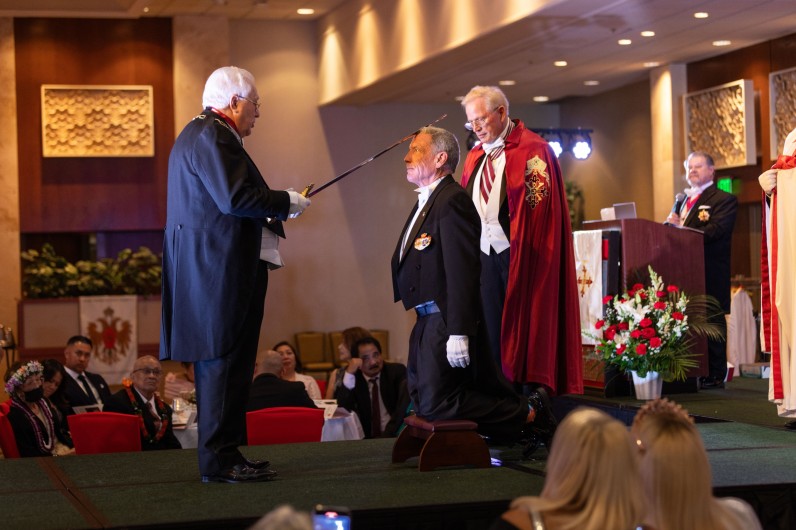
People generally associate power with control, which can be seen in the boardroom, the corner office, and the judge's chambers. For years, Baron James Gray Robinson believed the narrative that real power was found in dominating his industry, but with life pivots that would make most people's heads spin, he found it in a place where few were looking.
A former high-powered attorney turned spiritual teacher and a Baron in one of the oldest royal orders on Earth, Gray has spent his life studying the mechanics of both achievement and collapse. He's walked through burnout, rebuilt from the inside out, and emerged with a philosophy that's disarmingly simple yet radically profound. Service is the highest form of success.
"I hope the ripple effect is that people learn to lead from Guru Mode, where calm, clarity, and compassion guide their decisions, not stress or ego," he says. "When we center our lives in love and service, we give others permission to be kind to themselves and to those around them. When one person awakens to their own worth and inner power, the whole world feels it. This is my plan of world domination, a domination of the heart."
It's the kind of statement that feels almost out of place in a culture obsessed with winning. Yet it resonates precisely because it cuts against that grain. In an age of chronic stress and burnout, Robinson's worldview offers an antidote, a strategic framework for remembering that peace and performance aren't opposites, but allies.
From Warrior Mode to Guru Mode
Gray often describes the modern professional landscape as "a battlefield disguised as a boardroom." Leaders today, he says, are locked in a near-constant fight-or-flight response, what he calls Warrior Mode.
"People have a choice: to live in fear or to live in love. They're mutually exclusive," he explains. "When you're in survival mode, when your body's in fight or flight, your frontal cortex literally shuts down. You lose the ability to reason, to compromise, to think creatively. You make decisions from instinct, not insight."
This, he has learned, is the hidden root of burnout. Leaders mistake relentless output for impact, and adrenaline for ambition. In the process, they lose their ability to lead from the very qualities that make them human: empathy, curiosity, and compassion.
His counterpoint is Guru Mode, a state of leadership grounded in calm awareness. "When you come from a place of love and service, your nervous system relaxes. You think better. You connect better. You create better," he says. "That's not weakness. That's wisdom."
Beyond the Boardroom: A Life Measured by Service
Gray's own transformation began far from a meditation hall, in the courtroom, where years of high-stakes litigation left him successful but spiritually bankrupt. A nervous breakdown at 50 forced him to confront the cost of living in constant survival mode.
His recovery became a decade-long odyssey into neuroscience, trauma healing, and spirituality. He earned over thirty certifications in fields ranging from somatic psychology to energy medicine. What emerged for him on the other side was a reintegration of his former life and his current beliefs, a synthesis between intellect and intuition, science and spirit.
Today, Gray's work spans from C-suite coaching to humanitarian outreach. He helps executives and entrepreneurs dismantle the fear-driven patterns that once ruled his own life. His methods blend hard neuroscience with timeless compassion, giving high performers tools to lead without losing themselves.
"True leadership comes from service," he says simply. "From being willing to see a need and fill it, without needing the credit. That's where real strength lives."
A Global Mission with Local Roots
For Gray, service is a daily practice. As Royal Chancellor in a philanthropic order founded in 311 A.D., his work extends to global causes ranging from combating human trafficking to supporting orphans and preserving ecosystems. But his impact is just as visible in quiet, personal moments: mentoring young leaders, guiding burned-out executives, volunteering time to help people in emotional crises.
That quality, his refusal to separate the personal from the professional or the spiritual from the practical, has made him a rare figure in leadership circles.
The Heart at the Center of High Performance
What makes Robinson's philosophy powerful is its courage. It takes bravery to lead with compassion in a culture that rewards aggression. Paradoxically, the data now supports what Gray has lived: leaders who embody empathy, humility, and service build more innovative, loyal, and resilient teams.
"Compassion isn't soft," he says. "It's a stabilizing force. It keeps people from making fear-based decisions."
In his coaching work, he invites clients to measure success not just by financial gain or organizational growth, but by peace of mind, what he calls "soul-level ROI."
"When your actions are aligned with love and service, everything else flows naturally," he explains. "You make better choices, you build better relationships, and yes, you even make better profits. But it starts from within."
The Ripple Effect
Gray's life today is quieter than the high-stakes law career he left behind, but its impact is exponentially greater. From the boardroom to the monastery, his message remains the same: peace is not passive. It's a power state.
He calls it "the ripple effect of living with love at the center."
"When we make decisions from calm instead of chaos," he says, "we give others permission to do the same. That's how the world changes, not through revolution, but through resonance."
As the conversation ends, Gray laughs softly. "I used to want to dominate the courtroom," he says. "Now I want to dominate the heart. And the good news is, love doesn't run out."
For those ready to move from burnout to brilliance, and from Warrior Mode to Guru Mode, Gray's message is an invitation to begin within. Learn more about his work and service-centered leadership at jamesgrayrobinson.com.







Join the Conversation